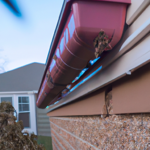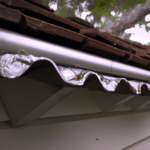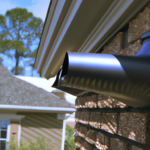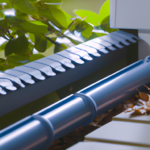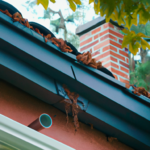-
Table of Contents
“Discover the Pros and Cons of Different Gutter Materials for Your Home.”
Introduction
Introduction: Gutters are an essential component of any home’s roofing system. They help to channel rainwater away from the roof and foundation, preventing water damage and erosion. There are several types of gutters available on the market, each with its own set of benefits and drawbacks. In this article, we will explore the different types of gutters, including aluminum, copper, steel, and vinyl, and discuss the pros and cons of each.
Aluminum Gutters: Pros and Cons
When it comes to choosing the right gutters for your home, there are a variety of options available on the market. One of the most popular materials for gutters is aluminum, due to its durability and affordability. In this article, we will explore the pros and cons of aluminum gutters to help you make an informed decision for your home.
Pros:
One of the biggest advantages of aluminum gutters is their durability. They are resistant to rust and corrosion, making them a great choice for homes in areas with high levels of moisture or salt in the air. Additionally, aluminum gutters are lightweight, which makes them easy to install and less likely to sag over time.
Another benefit of aluminum gutters is their affordability. They are typically less expensive than other materials, such as copper or steel, which makes them a great option for homeowners on a budget. Additionally, aluminum gutters are available in a variety of colors and styles, which means you can choose a design that complements the look of your home.
Cons:
While aluminum gutters have many benefits, there are also some drawbacks to consider. One of the biggest disadvantages is that they are not as strong as other materials, such as steel or copper. This means that they may not be able to withstand heavy snow or ice buildup, which can cause them to bend or break.
Another potential issue with aluminum gutters is that they can be prone to denting. This is especially true if they are hit by falling branches or other debris. While this may not affect the functionality of the gutters, it can detract from the appearance of your home.
Finally, aluminum gutters may not be the best choice for homes in areas with extreme temperatures. They can expand and contract with changes in temperature, which can cause them to warp or crack over time. This can lead to leaks and other issues that can be costly to repair.
Conclusion:
Overall, aluminum gutters are a great choice for homeowners who are looking for an affordable and durable option. While they may not be as strong as other materials, they are still able to withstand most weather conditions and are easy to install. However, if you live in an area with extreme temperatures or heavy snowfall, you may want to consider a different material for your gutters. Ultimately, the choice will depend on your specific needs and budget, so be sure to do your research and choose the option that is right for you.
Copper Gutters: Is it Worth the Investment?
When it comes to choosing the right gutters for your home, there are a variety of options available on the market. One of the most popular choices is copper gutters. While they may be more expensive than other materials, copper gutters offer a range of benefits that make them a worthwhile investment for many homeowners.
One of the biggest advantages of copper gutters is their durability. Copper is a highly durable material that can withstand extreme weather conditions, including heavy rain, snow, and ice. Unlike other materials that may rust or corrode over time, copper gutters are resistant to these types of damage, making them a long-lasting option for your home.
In addition to their durability, copper gutters also offer a unique aesthetic appeal. Over time, copper gutters develop a natural patina that gives them a beautiful, rustic look. This patina is a result of the copper reacting with the air and moisture in the environment, and it can take on a range of colors, from green to brown to blue. This natural aging process gives copper gutters a timeless look that can enhance the overall appearance of your home.
Another benefit of copper gutters is their low maintenance requirements. Unlike other materials that may require regular cleaning or painting, copper gutters are virtually maintenance-free. They do not need to be painted or sealed, and they are resistant to mold and mildew growth. This means that once you install copper gutters on your home, you can enjoy their benefits without having to worry about ongoing maintenance.
While copper gutters offer a range of benefits, there are also some drawbacks to consider. One of the biggest drawbacks is their cost. Copper gutters are more expensive than other materials, such as aluminum or vinyl. This can make them a less attractive option for homeowners who are on a tight budget.
Another potential drawback of copper gutters is their weight. Copper is a heavy material, which means that copper gutters can be more difficult to install than other materials. This may require additional labor costs or specialized equipment, which can add to the overall cost of the project.
Despite these drawbacks, many homeowners still choose copper gutters for their homes. The durability, aesthetic appeal, and low maintenance requirements of copper gutters make them a worthwhile investment for those who can afford them. If you are considering copper gutters for your home, it is important to work with a reputable contractor who has experience installing this type of gutter system. They can help you determine if copper gutters are the right choice for your home and provide you with a detailed estimate of the cost and installation process.
In conclusion, copper gutters are a popular choice for homeowners who are looking for a durable, low-maintenance, and aesthetically pleasing gutter system. While they may be more expensive than other materials, the benefits of copper gutters make them a worthwhile investment for many homeowners. If you are considering copper gutters for your home, be sure to work with a reputable contractor who can help you make an informed decision and ensure that your new gutters are installed correctly.
Steel Gutters: Durability and Maintenance

Steel Gutters: Durability and Maintenance
Steel gutters are a popular choice for homeowners due to their durability and low maintenance requirements. They are made from galvanized steel, which is coated with a layer of zinc to prevent rust and corrosion. Steel gutters are available in a variety of colors and can be painted to match the exterior of your home.
Durability
One of the main advantages of steel gutters is their durability. They are strong and can withstand harsh weather conditions, including heavy rain, snow, and wind. Steel gutters are also resistant to fire, making them a safe choice for homes in areas prone to wildfires.
Maintenance
Steel gutters require minimal maintenance, making them a popular choice for homeowners who want to avoid the hassle of regular upkeep. They do not need to be cleaned as often as other types of gutters, and they are less likely to become clogged with debris. However, it is still important to inspect your steel gutters regularly to ensure that they are functioning properly.
If you do notice any issues with your steel gutters, such as rust or corrosion, it is important to address them as soon as possible. Rust can weaken the structure of your gutters and cause them to fail, which can lead to water damage to your home. To prevent rust and corrosion, it is recommended to have your steel gutters coated with a layer of paint or sealant.
Installation
Steel gutters are relatively easy to install, and they can be customized to fit the specific needs of your home. They are available in a variety of sizes and shapes, including half-round and K-style. Steel gutters can also be installed with hangers or brackets, which provide additional support and stability.
Cost
The cost of steel gutters varies depending on the size and style of the gutters, as well as the cost of installation. Steel gutters are generally more expensive than vinyl gutters but less expensive than copper gutters. However, the durability and low maintenance requirements of steel gutters make them a cost-effective choice in the long run.
Conclusion
Steel gutters are a durable and low-maintenance option for homeowners who want to protect their homes from water damage. They are strong enough to withstand harsh weather conditions and are resistant to fire. While they may be more expensive than vinyl gutters, their durability and longevity make them a cost-effective choice in the long run. If you are considering steel gutters for your home, be sure to consult with a professional to ensure that they are installed correctly and maintained properly.
Vinyl Gutters: Affordable and Easy to Install
When it comes to gutters, there are a variety of materials to choose from. One popular option is vinyl gutters. These gutters are affordable and easy to install, making them a great choice for homeowners on a budget or those who prefer a DIY approach.
Vinyl gutters are made from PVC plastic, which is lightweight and durable. They come in a variety of colors, so you can choose a shade that complements your home’s exterior. Vinyl gutters are also resistant to rust and corrosion, which means they can last for many years with proper maintenance.
One of the biggest advantages of vinyl gutters is their affordability. They are one of the most cost-effective options on the market, making them a popular choice for homeowners who want to save money. Additionally, vinyl gutters are easy to install, which means you can save even more money by doing the installation yourself.
Another benefit of vinyl gutters is that they are low-maintenance. Unlike other materials, such as copper or steel, vinyl gutters do not require regular painting or sealing. They are also easy to clean, as you can simply wipe them down with a damp cloth or hose them off with a garden hose.
However, there are some drawbacks to vinyl gutters that you should be aware of. One of the biggest concerns is their durability. While vinyl gutters are resistant to rust and corrosion, they can become brittle over time, especially in extreme temperatures. This means that they may crack or break if exposed to harsh weather conditions, such as heavy snow or hail.
Another potential issue with vinyl gutters is their appearance. While they come in a variety of colors, some homeowners may find that they do not look as attractive as other materials, such as copper or steel. Additionally, vinyl gutters may not be suitable for historic homes or those with a more traditional aesthetic.
Despite these drawbacks, vinyl gutters remain a popular choice for many homeowners. They are affordable, easy to install, and low-maintenance, which makes them a practical option for those who want to save money and time. If you are considering vinyl gutters for your home, be sure to choose a reputable manufacturer and installer to ensure that they are installed correctly and will last for many years to come.
In conclusion, vinyl gutters are a great option for homeowners who want an affordable and easy-to-install gutter system. While they may not be as durable or attractive as other materials, they offer many benefits that make them a practical choice for many homeowners. If you are considering vinyl gutters for your home, be sure to do your research and choose a reputable manufacturer and installer to ensure that you get the best possible results.
Seamless Gutters vs. Sectional Gutters: Which is Better?
When it comes to gutters, there are a variety of options available on the market. Two of the most popular types are seamless gutters and sectional gutters. But which one is better? Let’s explore the benefits and drawbacks of each.
Seamless gutters are made from a continuous piece of material, which is custom-fit to the exact measurements of your home. This means that there are no seams or joints in the gutter system, which can help prevent leaks and clogs. Seamless gutters are typically made from aluminum, but can also be made from copper or steel.
One of the biggest benefits of seamless gutters is their durability. Because they are custom-fit to your home, they are less likely to sag or pull away from the house over time. This can help prevent water damage to your home’s foundation and landscaping. Seamless gutters also require less maintenance than sectional gutters, as there are no joints or seams to clean out.
However, seamless gutters can be more expensive than sectional gutters. Because they are custom-fit to your home, they require more labor and materials to install. Additionally, if a section of the gutter system becomes damaged, the entire system may need to be replaced, as it is all one continuous piece.
Sectional gutters, on the other hand, are made from smaller sections of material that are pieced together to form the gutter system. They are typically made from aluminum or vinyl, but can also be made from steel or copper. Sectional gutters are often less expensive than seamless gutters, as they require less labor and materials to install.
One benefit of sectional gutters is that they are easier to repair. If a section of the gutter system becomes damaged, only that section needs to be replaced, rather than the entire system. Additionally, sectional gutters are easier to install on your own, if you are a DIY enthusiast.
However, sectional gutters are more prone to leaks and clogs than seamless gutters. Because they have joints and seams, they are more likely to develop leaks over time. Additionally, the joints and seams can collect debris, which can lead to clogs and water damage.
So, which type of gutter is better? It ultimately depends on your individual needs and budget. If you are looking for a durable, low-maintenance option and are willing to invest more upfront, seamless gutters may be the way to go. However, if you are looking for a more affordable option that is easier to repair, sectional gutters may be a better fit.
Regardless of which type of gutter you choose, it is important to properly maintain and clean your gutter system to prevent water damage to your home. Regularly cleaning out debris and checking for leaks can help extend the life of your gutters and protect your home from water damage.
Q&A
1. What are aluminum gutters?
Aluminum gutters are lightweight and durable, making them a popular choice for homeowners. They are resistant to rust and corrosion, but can dent easily.
2. What are copper gutters?
Copper gutters are known for their aesthetic appeal and durability. They are resistant to rust and corrosion, and develop a natural patina over time. However, they are more expensive than other types of gutters.
3. What are steel gutters?
Steel gutters are strong and durable, but can rust over time. They are often coated with a layer of zinc or other protective material to prevent rusting.
4. What are vinyl gutters?
Vinyl gutters are lightweight and easy to install, making them a popular choice for DIY projects. They are resistant to rust and corrosion, but can become brittle over time and may crack in extreme temperatures.
5. What are the benefits of each type of gutter?
Aluminum gutters are lightweight and durable, copper gutters are aesthetically pleasing and long-lasting, steel gutters are strong and durable, and vinyl gutters are easy to install and resistant to rust and corrosion. However, each type also has its drawbacks, such as denting for aluminum gutters, cost for copper gutters, rusting for steel gutters, and brittleness for vinyl gutters.
Conclusion
In conclusion, there are several types of gutters available on the market, each with its own set of benefits and drawbacks. Aluminum gutters are lightweight and easy to install, while copper gutters are durable and have an attractive appearance. Steel gutters are strong and long-lasting, but can be prone to rusting. Vinyl gutters are affordable and low-maintenance, but may not be as durable as other materials. It is important to consider your specific needs and budget when choosing the right type of gutter for your home.
